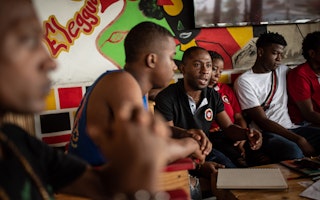Q&A: Driving a Global and Ethical Dialogue on Climate Policy

Sitawi is a Brazil based organization with a mission of mobilizing capital for positive social and environmental impact. We spoke with Sitawi's head of philanthropy management, Fernanda Pessoa, at COP30 on how the organization got involved with broadening the climate dialogue through the Global Ethical Stocktake.
Tell us about what Sitawi is and what the organization does.
Sitawi is a pioneering Brazilian non-profit organization dedicated to expanding the capital available for social and environmental impact. For almost 18 years now, we have been developing financial mechanisms that help bring more resources, more flexibility, and more efficiency to the social impact space.
What are some of the innovative financial solutions Sitawi supports to generate socioeconomic impact?
We work with a range of blended finance and catalytic funding mechanisms that are still relatively new in the Global South. Some examples include philanthropic funds tailored to donors and impact teams, recoverable grants and impact loans, and results-based finance and collaborative funds which pull resources from multiple donors to address complex systemic issues like climate justice, racial equity, and the bioeconomy. All of these solutions are designed to allow capital that might not otherwise reach high-impact local organizations.
Tell us about the Global Ethical Stocktake.
The Global Ethical Stocktake is a civil society–driven process designed to complement the Paris Agreement’s Global Stocktake by assessing not only technical climate progress but also the ethical dimensions of climate action—such as responsibility, equity, planetary stewardship, and the protection of vulnerable communities. It seeks to bring moral clarity to the climate crisis by integrating voices from across regions, cultures, and sectors that are often underrepresented in formal negotiations.
The initiative has gained global visibility as part of the Círculo da COP, launched by Brazil’s President Lula and the UN Secretary-General António Guterres, and led in Brazil by Marina Silva, the Minister of the Environment and Climate Change. The goal of the Global Ethical Stocktake is to broaden global climate dialogue and mobilize society around climate justice ahead of COP30 in the Amazon.
How did Sitawi get involved with the Global Ethical Stocktake?
Sitawi became involved in the Global Ethical Stocktake through a partnership with Brazil’s Ministry of the Environment, which needed a trusted organization to support the financial management of the Global Ethical Stocktake. Through this partnership, Sitawi has helped operate the initiative, ensuring its execution and financial viability, strengthening the infrastructure needed for a truly global and justice centered climate dialogue.
Our role enables the initiative to operate with strong governance and ensures that resources are deployed efficiently, transparently, and in alignment with its ethical mission.
Globally, the stocktake has been convening dialogues and consultations across continents—Africa, Latin America, North America, Asia, and Europe—bringing together Indigenous leaders, youth, academics, policymakers, and civil society organizations to articulate what ethical climate action looks like in practice. These global inputs feed into a consolidated report that was presented in the lead-up to COP30, reinforcing the moral imperative for countries to accelerate climate ambition.
Why was the Global Ethical Stocktake important to do ahead of COP30?
COP30 is a milestone moment. It is the first COP hosted in the Amazon, and a critical checkpoint for implementing a just transition. The Global Ethical Stocktake was essential because it brings moral courage to climate action, which is often dominated by technical or geopolitical narratives. It highlights responsibility, especially from those who have contributed the most to the climate crisis. It centers vulnerable communities and their right to adaptation, resilience, and development.
Doing this before COP30, and also here today at COP30, ensures that ethical considerations inform negotiations, commitments, and financing pathways.
How are the results of the Global Ethical Stocktake being shared at COP30?
The results are being shared at a pavilion space at COP30, with artistic interventions and eco-decorations representing the global findings, as well as panels, press briefings, and side events across the COP30 blue zone.
Regional reports and testimonials are also being presented directly to the negotiations in collaboration with the civil society coalitions, so they can integrate the findings into negotiations and finance adaptation and just transition.
What outcomes do you hope to see post-COP30?
Personally, I hope to see stronger financial commitments, especially for adaptation and loss and damage, simplified access to climate finance, some clear pathways for a just transition, and more collaboration across philanthropy, government, and the private sector to scale solutions locally.
Fundamentally, I hope COP30 advances a model of climate governance grounded in ethics, inclusion, and shared responsibility—one that is about moral and social dimensions, and not just technical one.
The Global Ethical Stocktake hosted six regional dialogues, read the key takeaways from Africa, Asia, Central and South America and the Caribbean, Europe, North America, and Oceania.
Sitawi is a grantee of the Open Society Foundations.


